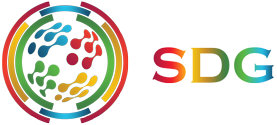Proposed Solution 1
Decentralized Products' Identification
Products' Rapid Identification
The Rapid Identification and Removal of Expired,
Contaminated, and Decaying Products to prevent the spread of diseases from the supply chain
Distinguishing Organic & Non-organic Products
Distinguishing between Organic and Non-organic Products by the consumer and transparency in their distribution or supply cycle
Tracking Products
Tracking Products by manufacturers and distributors just in a few seconds
SDG Token is a decentralized system that utilizes IoT Technology to gather, transmit, and disseminate the related data of manufactured products. Each product is tagged by an RFID tag containing A Unique Digital Cryptographic Identifier interconnecting to the virtual identity of the tagged product in the blockchain network. This Virtual Identity is shown as a profile containing the Product Information and its Manufacturing Process.
Big data is loaded in a decentralized data warehouse, packed in BlockchainDB software, and thus shown in a completely transparent manner. Indeed, it might have been controlled and managed by a combination of policies about interacting credentials situations.
Executing the proposed solution can be considered to help achieve the results
By 2030, Build the resilience of the POOR and those in vulnerable situations and Reduce their exposure and vulnerability to climate-related extreme events and other economic, social and environmental shocks and disasters.
By 2030, END HUNGER and ensure access by all people, in particular the poor and people in vulnerable situations, including infants, to safe, nutritious and sufficient food all year round.
By 2030, Double the agricultural productivity and incomes of small-scale food producers, in particular women, indigenous peoples, family farmers, pastoralists and fishers, including through Secure and Equal access to land, other productive resources and inputs, knowledge, financial services, markets and opportunities for value addition and non-farm employment.
By 2030, ensure Sustainable FOOD production systems and implement resilient agricultural practices that increase productivity and production, that help maintain ecosystems, that strengthen capacity for adaptation to climate change, extreme weather, drought, flooding and other disasters and that progressively improve land and soil quality.
Adopt measures to ensure the proper functioning of food commodity markets and their derivatives and facilitate timely access to market information, including on food reserves, in order to help limit extreme food price volatility.
By 2030, substantially Reduce the number of DEATHS and ILLNESSES from hazardous chemicals and air, water and soil pollution and contamination.
Develop quality, reliable, sustainable and resilient INFRASTRUCTURE, including regional and transborder infrastructure, to support economic development and human well-being, with a focus on affordable and equitable access for all.
Enhance Scientific Research, upgrade the technological capabilities of industrial sectors in all countries, in particular developing countries, including, by 2030, encouraging INNOVATION and substantially increasing the number of research and development workers per 1 million people and public and private research and development spending.
